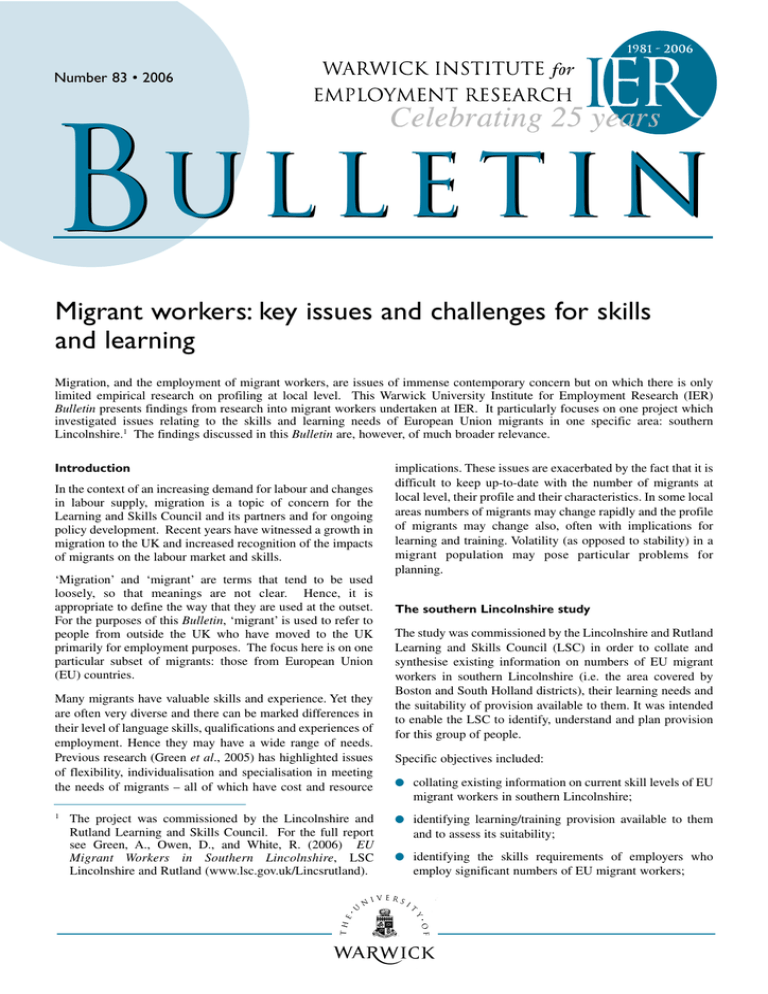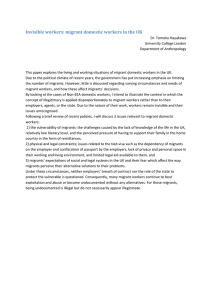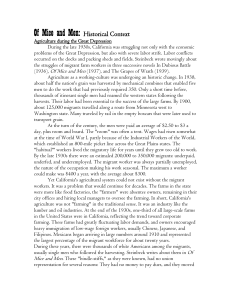B U L L E T I N and learning
advertisement

Number 83 • 2006 BU L L E T I N Migrant workers: key issues and challenges for skills and learning Migration, and the employment of migrant workers, are issues of immense contemporary concern but on which there is only limited empirical research on profiling at local level. This Warwick University Institute for Employment Research (IER) Bulletin presents findings from research into migrant workers undertaken at IER. It particularly focuses on one project which investigated issues relating to the skills and learning needs of European Union migrants in one specific area: southern Lincolnshire.1 The findings discussed in this Bulletin are, however, of much broader relevance. Introduction In the context of an increasing demand for labour and changes in labour supply, migration is a topic of concern for the Learning and Skills Council and its partners and for ongoing policy development. Recent years have witnessed a growth in migration to the UK and increased recognition of the impacts of migrants on the labour market and skills. ‘Migration’ and ‘migrant’ are terms that tend to be used loosely, so that meanings are not clear. Hence, it is appropriate to define the way that they are used at the outset. For the purposes of this Bulletin, ‘migrant’ is used to refer to people from outside the UK who have moved to the UK primarily for employment purposes. The focus here is on one particular subset of migrants: those from European Union (EU) countries. Many migrants have valuable skills and experience. Yet they are often very diverse and there can be marked differences in their level of language skills, qualifications and experiences of employment. Hence they may have a wide range of needs. Previous research (Green et al., 2005) has highlighted issues of flexibility, individualisation and specialisation in meeting the needs of migrants – all of which have cost and resource 1 The project was commissioned by the Lincolnshire and Rutland Learning and Skills Council. For the full report see Green, A., Owen, D., and White, R. (2006) EU Migrant Workers in Southern Lincolnshire, LSC Lincolnshire and Rutland (www.lsc.gov.uk/Lincsrutland). implications. These issues are exacerbated by the fact that it is difficult to keep up-to-date with the number of migrants at local level, their profile and their characteristics. In some local areas numbers of migrants may change rapidly and the profile of migrants may change also, often with implications for learning and training. Volatility (as opposed to stability) in a migrant population may pose particular problems for planning. The southern Lincolnshire study The study was commissioned by the Lincolnshire and Rutland Learning and Skills Council (LSC) in order to collate and synthesise existing information on numbers of EU migrant workers in southern Lincolnshire (i.e. the area covered by Boston and South Holland districts), their learning needs and the suitability of provision available to them. It was intended to enable the LSC to identify, understand and plan provision for this group of people. Specific objectives included: ● collating existing information on current skill levels of EU migrant workers in southern Lincolnshire; ● identifying learning/training provision available to them and to assess its suitability; ● identifying the skills requirements of employers who employ significant numbers of EU migrant workers; 2 Figure 1: Inflows of foreign workers to the UK, 1992-2004 100 80 thousands 60 long term short term 40 total 20 2004 2003 2002 2001 2000 1999 1998 1997 1996 1995 1994 1993 1992 0 year Source: Based on grants of Work Permits (excluding dependants). Long-term is 12 months or more; short-term is less than 12 months. Data exclude EU nationals up to 1993, and EEA nationals since 1994. Figures include extensions and changes of employment. ● as far as information sources allowed, identifying and presenting likely future learning needs of EU migrant workers – especially in respect of English for Speakers of Other Languages (ESOL), Basic Skills and qualifications at Levels 1-3; ● identifying whether different EU migrant worker communities have different learning needs and face different barriers in accessing learning; and to suggest how these barriers might be tackled; ● making recommendations for the LSC and key stakeholders regarding future activity in order to monitor numbers of EU migrants, their learning needs and how to address those needs. Methodology The project involved identifying and reviewing research that has been undertaken on migrants (and more specifically EU migrants) in southern Lincolnshire, together with other recent research on migrant workers (especially those from the EU) in other rural areas in England. In addition, a number of telephone interviews were conducted with representatives of relevant local and regional organisations. Detailed primary research was not undertaken, but a study involving data collection from migrants, employers and labour providers has been undertaken in the area (Zaronaite and Tirzite, 2006). Labour market context Southern Lincolnshire is a rural area which, in common with many other such peripheral areas, is characterised by a limited range of employment opportunities (with few jobs in knowledge-intensive and higher level non-manual occupations outside the public sector), low wages and skill levels, poor access to key services, limited childcare provision, patchy public transport and out-migration amongst young people. Unemployment is at historically low levels. Why employ migrant workers? Migrant workers are of crucial strategic importance to the local economy to meet labour requirements (most relatively low skilled) in the food, agricultural and horticultural industries. Key points include: ● Employers of low-skilled workers feel that labour shortages are a primary reason for recruiting migrant workers (see Dench et al., 2006). 3 ● In the food manufacturing sector in southern Lincolnshire migrant workers are seen as essential to the industry and a long-term solution to labour/skills shortages. ● The advantages of employing migrant workers mentioned by employers include lower labour turnover and absenteeism, preparedness to work longer and flexible hours (research from the food manufacturing sector cites up to 58 hours in most instances [Food and Drink Forum, 2004]), worker satisfaction with duties and hours of work, and a more favourable work ethic than possessed by UKborn workers – resulting in greater productivity, reliability and speed of working. Nationally, agencies play an important role in the employment of migrants. They are often used to recruit migrant workers in low-skill sectors – although views on costs and satisfaction with this recruitment route vary. Agency recruitment has tended to be most successful in those cases where agencies have: good relationships with employers; awareness of business requirements; and make checks on the legality of workers (Dench et al., 2006). In the agriculture and food processing industries the flexibility offered by use of migrant labour to meet the peak/trough demand scenarios inherent within the business is crucial. Skills and learning There is no single comprehensive source of information on EU migrant skills available, which can be used to inform future learning provision. Thus, within a heterogeneous and relatively dynamic migrant community, the means of identifying the skills and experiences of sub-groups in the population is highly problematic (despite surveys, skills audits and other initiatives designed to get to grips with this matter). Where information on qualifications and skills of EU migrants is available there may be difficulties in verifying the validity and equivalence of such qualifications in a UK context. Despite this, the study concluded that: ● EU migrants bring with them a wide range of skills and experiences: there is no such thing as a ‘typical’ migrant – even from a particular origin country. Rather, ‘skills sets’ are often highly individualised and specialised, and this needs to be recognised in future discussions of skills development and learning provision. ● Many migrants have an inability to represent themselves adequately beyond a basic grasp of written or spoken English. ● Migrant workers are generally employed well below their existing skill levels and experiences. Employers’ skills requirements Unsurprisingly, employers’ skills requirements are varied in detail – in accordance with the nature of employment; the size of the firm, and individual job-specific factors (relating to specific occupations/organisational roles). The main conclusions relating to two particularly important sectors in southern Lincolnshire – the food industry and construction – were that: ● Some basic understanding of English (e.g. needed for reasons of communication and for health and safety reasons) is a fundamental requirement in both the construction and food industry. ● As migrants become ‘core’ (as opposed to ‘peripheral’ employees), employers’ and employees’ requirements for skills are likely to increase. This is already happening in Table 1: Employment rates by ethnic group and nationality 2004/5 – southern Lincolnshire Rutland Boston East Lindsey Lincoln North Kesteven South Holland South Kesteven West Lindsey Total Note: Source: employed population (%) white UK national (%) white not UK national (%) ethnic minority UK national (%) ethnic minority non-UK national 21,000 29,500 72,000 48,600 55,900 43,700 74,700 46,400 391,700 78.0 75.5 71.0 68.3 80.0 77.8 78.6 74.7 75.3 100.0 77.8 ! 80.6 ! 100.0 88.8 ! 81.0 ! 71.1 78.7 58.9 63.7 40.0 56.8 77.1 59.5 ! 85.5 ! 64.7 100.0 91.7 ! 74.0 77.9 ! indicates estimate and confidence interval not available since the group sample size is zero or disclosive (0-2). Annual Population Survey (via Nomis) 4 southern Lincolnshire, as the Food & Drink Forum (2004: 47) noted: “There is already strong evidence of a commitment by the industry to up-skill its migrant workforce for long-term benefit…”. ● Conditions of working (e.g. long hours, physically demanding nature of the tasks) may impose barriers to learning. ● Transport barriers come into play in accessing learning Current and likely future learning needs There is little detailed information (by qualification) on current and future learning needs of migrant workers, although this gap has been filled in the short-term by primary research. Current learning needs of EU migrants are primarily focused on language – and most migrants are very keen to improve their English. Some motivations for improving a working knowledge of English included ‘getting a better life’ ‘obtaining a permanent job’ and ‘gaining promotion within a company’ (Food and Drink Forum, 2004: 17). The study concluded that in southern Lincolnshire, in the short-term, language training (ideally tailored to the immediate needs of the work environment and the more general social context) should be addressed before or alongside any other learning needs of EU migrants are considered. Importantly, the learning needs of EU migrants and their employers’ needs must be taken into consideration. In the food industry there is a continuing economic need for workers in occupations requiring low level skills. Hence, it is understandable that employment agencies may not be interested in specific skills of migrant workers. opportunities. Many migrant workers may not live near their workplace – or indeed may have to move between workplaces on a relatively frequent basis. Current skills and learning training provision A flavour of current initiatives concerning the skills and leaning provision in southern Lincolnshire was highlighted in the report. These included: ● ESOL. In 2004 the Food & Drink Forum identified 75 providers in the East Midlands region of which 58 were currently running ESOL courses. ● Skills Passports, which record the skills and technical knowledge of an employee in one document (e.g. induction training, employment policies & procedures, health & safety procedures, food safety regulations, quality control policy and procedures). The benefits of the Skills Passports are varied, but allow a highly visible and portable means for employees to give proof of their skills when moving from one job to another. ● Food Hygiene for Foreign Nationals, which is a multi- Barriers to learning The report found that barriers to learning provision and delivery covered a wide spectrum, and were not necessarily specific to particular sub-groups of migrants. Some of the more generic barriers highlighted included: ● A non-existent or only basic grasp of English amongst some migrants. This often precluded access to further learning, as well as to key services including housing, social care and health care. ● A related barrier concerning information/knowledge deficits (on the part of some employers as well as some migrants) regarding understanding of the relevance and availability of learning opportunities. ● Engaging migrants in learning opportunities may be difficult. This in turn relates, in part, to the attitudes, wants, needs and expectations of the migrants themselves. Duration of stay may be an important variable here. partner initiative involving Geest Foods Ltd, Geo Adams, QV Foods, Geest QV and Emmett UK Ltd aiming to facilitate the integration of foreign national workers into the food industry, by securing for them long-term employment and social inclusion. Challenges and constraints to learning provision delivery A number of key challenges and constraints relevant to learning provision and delivery emerged within the report. Those considered included: ● Funding as a key constraint on learning provision and delivery. A common concern of those involved with delivery is that the costs of provision are not recognised in nationally administered funding formulae. ● The cost to employers of enabling workers to have the flexibility to attend classes. ● The sheer numbers of migrants coming to the local area ● The prior skills of migrants are also an important factor. Some migrant workers in jobs demanding no/low formal qualifications may not have had much experience of formal education, and an appeal to ‘go into a college’ to learn may be completely alien. over a relatively short time period. This placed a severe constraint on available capacity/resources – in terms of staff, premises, training materials, etc. Existing problems may be exacerbated by increasing inflows/churning of migrants. 5 ● Local colleges, which have been inundated with requests ● In part, this reflects a lack of accessible information for for ESOL may have a long waiting list for courses; but contacting individuals on the waiting list can be difficult if places become available. migrant workers before arriving in the UK on UK skill shortages, job vacancies, the ‘British system’, and rights, entitlements and responsibilities in the UK. ● Flexibility of delivery was a further issue. Given the ● Employers play a crucial role in the experience of migrant pressured and variable nature of employment that many migrants are engaged in, a degree of flexibility in terms of timing and location of delivery was seen to be necessary. workers and in facilitating (or otherwise) access to education and training. ● The pressured nature of the work many migrants are engaged in (i.e. long hours, shift work, intensive labour) impacts on the ability of workers to participate in and reach required standards of attainment to achieve certification. ● Since ESOL is funded on the basis of outcomes, retention and non-completion are key issues. Finally, a lack of clarity about whose responsibility training should be is a challenge faced by deliverers. Questions concerning responsibility could arise where a company negotiates with a labour provider, and assumes that the responsibility lies with agencies to provide training in areas such as induction, health & safety, job skills instruction, basic English skills and diversity/cultural training (see Food & Drink Forum, 2004: 25). Thus, demarcating clear lines of responsibility at the outset was seen to be beneficial in determining how best practice and support for migrant workers can be put in place. Conclusions: key messages The following key messages arise from the study: ● Migrants are very diverse. ● English language skills are very important in enabling labour market integration of migrants. ● Many migrants have a lack of awareness of English/UK culture (both within and beyond the workplace). ● Many migrants are not utilising the skills that they bring with them: they are working below their skills level. ● Lack of recognition of overseas qualifications is an important contributory issue here. ● Given that the size and profile of migrant flows could change over time, it is important to monitor such flows and employers’ skills requirements on a continuing basis. ● Issues concerning ESOL, information advice and guidance, etc, are relevant to a host of organisations and cannot be addressed in isolation. ● Challenges and constraints to learning provision and delivery require inter-/multi-agency working if they are to be addressed successfully References Dench S., Hurstfield J., Hill D. and Akroyd K. (2006) ‘Employers’ use of migrant labour’, Home Office Online Report 03/06. Food & Drink Forum (2004) English for non-English speakers in the food manufacturing sector, Project commissioned by emda. Green A., Owen D. and White R.J. (2006) EU Migrant Workers in Southern Lincolnshire, Report for Lincolnshire and Rutland LSC. Green A.E., Owen D.W. and Wilson R.A. (2005) Changing Patterns of Employment by Ethnic Group and for Migrant Workers, Report prepared for the LSC, IER, University of Warwick, Coventry. See: http://readingroom.lsc.gov.uk/lsc/ 2006/research/commissioned/natchangingpatternsofemploy mentbyethnicgroupand formigrantworkers-re-may2006.pdf. Zaronaite D. and Tirzite A. (2006) The dynamics of migrant labour in south Lincolnshire, South Holland District Council, Spalding. See: http://www.migrantworker.co.uk/docs/The% 20Dynamics%20of%20Migrant%20Labour%20in%20South %20Lincolnshire%20(2).pdf. For further information about this and other projects visit the IER website at www.warwick.ac.uk/IER or e-mail ier@warwick.ac.uk. 6 Copies of previous bulletins can be found at: www.ac.uk/IER/publications/bulletins/ Past titles include: ■ Skills and the prospects for growing new medical technology businesses ■ Working Futures 2004-2014 ■ Workless couples and partners of benefit claimants: a review of the evidence ■ Identifying the Penalties in Pay Associated with Motherhood – a European comparative analysis ■ What is effective career guidance? Evidence from longitudinal case studies in England





